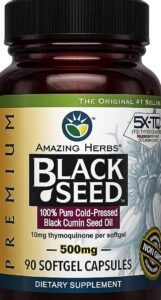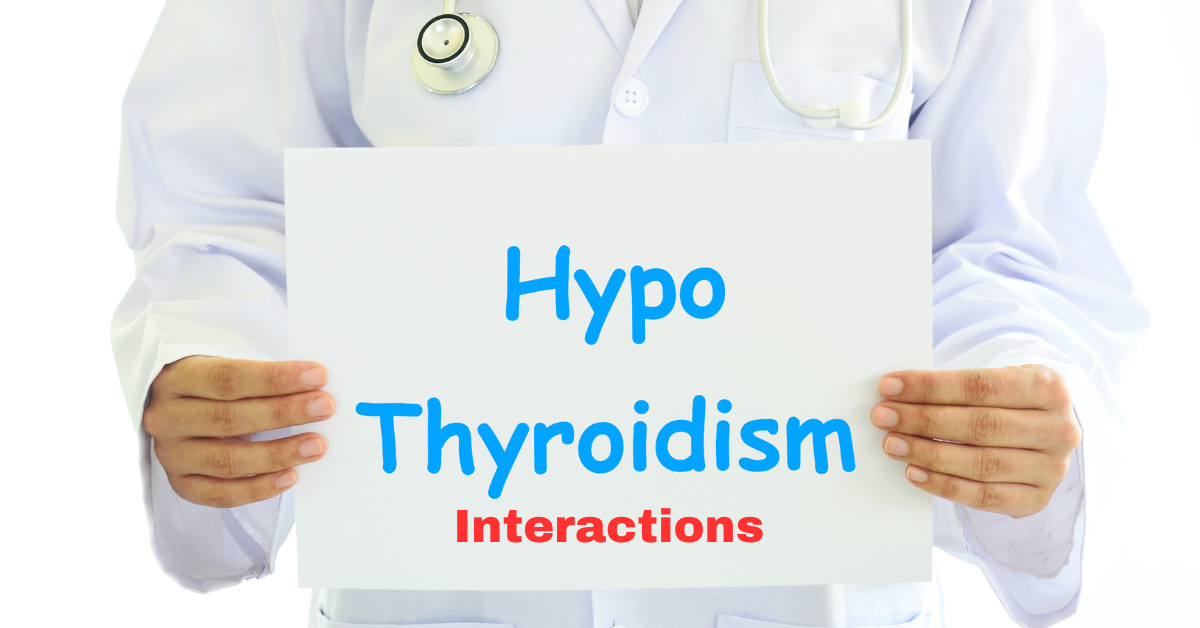If you are one of the 23 million people in the United States alone who have hypothyroidism and take levothyroxine (Synthroid), you should be aware of possible negative interactions with food and dietary supplements. Levothyroxine is a hormone replacement therapy medication that restores a hormone, called thyroxine, that your body is deficient in. Taking levothyroxine correctly is essential for maintaining proper thyroid hormone levels and ensuring the medication is effective. Unfortunately, many do not know what to avoid when taking levothyroxine.
Levothyroxine & Synthroid: What Are They?
When people have an underactive thyroid gland, they have to supplement with medication to replace the thyroid hormone they are not making enough of. The drug of choice is usually levothyroxine, which consists of the T4 thyroid hormone. Thyroxine (also called T4) is the primary hormone in the blood.
Levothyroxine is the synthetic version of the natural hormone called thyroxine. When you take T4, it is converted into T3, the more active thyroid hormone that the body uses. The body uses iodine to convert T4 into T3.
Synthroid is one popular brand name for levothyroxine tablets. In other words, Synthroid and levothyroxine are the same thing. Levothyroxine is the 2nd most prescribed drug in the United States. However, a recent survey revealed over 50% of people taking it take supplements and foods, which can reduce how effective it is.
What Is TSH, And Why Is It Measured For Hypothyroidism?
Measuring your thyroid stimulating hormone (TSH) is one of the principal ways your doctor will check to see if you have an underactive thyroid. The TSH hormone, which is made in the pituitary gland in your brain, causes you to make thyroid hormones.
The principal thyroid hormones are called T4 (thyroxine) and T3 (Triiodothyronine). Synthroid is the T4 hormone that gets converted into T3 in the body.
The T3 hormone, in turn, promotes many of the beneficial effects associated with a normal-active thyroid gland.
As the thyroid gland fails, the body makes more TSH to compensate. Doctors can measure TSH with a blood test.
Here is how TSH is related to thyroid hormones:
- As TSH levels increase, we make more thyroid hormone.
- As TSH drops, we make less thyroid hormone.
Hypothyroidism vs. Hyperthyroidism:
- People with hypothyroidism have higher-than-normal TSH levels.
- People with hyperthyroidism have lower-than-normal TSH levels.
What Is a Normal TSH Level?
According to the Endocrine Society, a normal thyroid-stimulating hormone can range from 3 to 4 milliunits per liter (mIU/L). However, others say this varies from 0.5 to 5 mIU/L. If you have hypothyroidism, taking medicine will lower your TSH to a more normal level.
Because TSH levels can vary depending on age, sex, and health issues, speak to your doctor about what is the best range for you.
How Long Does It Take To Absorb Synthroid?
There are different types of T4 levothyroxine medications, such as:
- liquid form
- tablets
- soft gel
Tablets are the most common. Absorption can vary between the forms. With tablets, the levothyroxine is absorbed 20 to 30 minutes after you take it.
Generally, taking thyroid medication with foods can decrease its bioavailability by between 15% and 40%! Thus, it makes sense not to take levothyroxine with food. Doing so will reduce the amount of T4 and T3 hormones in your body and make your hypothyroidism symptoms worse.
Effects of Meals, Beverages, and Dietary Supplements on Levothyroxine Absorption
Studies reveal that certain foods and supplements can interfere with the absorption of levothyroxine (Synthroid). This means that your body may not be able to use the medication properly, leading to suboptimal thyroid hormone levels and potentially worsening your hypothyroidism symptoms.
Foods that Decrease Levothyroxine Absorption
Fiber-Containing Foods
Avoid taking your thyroid medicine at the same time you take fiber-containing foods or supplements. This includes fruits, vegetables, beans and seeds as well as whole grains. Levothyroxine binds to fiber, leading to the drug not being absorbed as well as it should.
This can lead to the medication not lowering your TSH levels and not improving your hypothyroid symptoms. This also appears to occur when using fiber supplements like psyllium (Metamucil).
What this means: separate your medicine from fiber-containing foods by at least an hour.
Soy Protein Foods and Thyroid Hormone
While some research has suggested soy had no effects on thyroid hormone, other studies seem to cast doubt on this. In one report, a woman who was taking Synthroid started experiencing signs of an underactive thyroid, such as an increase in her TSH levels. This required her doctor to give her a higher dose of the medication.
What was the cause? It turned out she was drinking a soy-protein-containing beverage at the same time she took her thyroid medicine. Her TSH levels and hypothyroid symptoms returned to normal once she stopped this practice.
Other studies suggest parents should avoid giving soy-infant formulas to babies who have hypothyroidism. In infants who take thyroid medication, the soy-baby formulas appear to reduce the absorption of the medication. This may be because soy beverages and foods contain compounds called goitrogens, which reduce iodine absorption.
What this means: Consider not swallowing your medication with soy beverages and avoiding baby formulas that contain soy if your infant has hypothyroidism.
Coffee And Synthroid Absorption
Billions of people consume coffee daily, often as an early morning pick-me-up with breakfast. If you take hypothyroid medicine, you may want to adjust your before-noon routine. Here's why: when researchers gave people with hypothyroidism 100 mcg of thyroid medicine tablets (levothyroxine) with coffee, the beverage significantly reduced the rise in T4 thyroid hormone by about 36%.
Furthermore, coffee also reduced thyroid hormone by 29% in healthy people too!
However, this did not happen when coffee was consumed 1 hour after taking the thyroid medication.
What this means: you can still enjoy coffee. Just drink it at least 1 hour after taking Synthroid.
Tea Thyroid Hormone Interactions
There is one report of a woman who experienced elevated TSH when she took her medicine with mint tea. After she switched to taking levothyroxine with water, her TSH levels declined to normal, and her thyroid hormone levels increased.
Further proof comes from a clinical study where TSH significantly increased when people consumed tea at the same time they took thyroid medicine. When they stopped this practice, TSH levels dropped from about 36 down to 7 mIU/L. Some saw even lower TSH levels. It's speculated that tea works against hypothyroidism like coffee does.
What this means: Tea seems to reduce the absorption of the T4 thyroid hormone found in Synthroid tablets. Don't drink tea for at least an hour after taking levothyroxine tablets.
Milk & Calcium Supplements: Bad Combo For The Thyroid Gland?
When people took 1000 mcg of thyroid hormone with 12 oz (355 ml) of 2% cow's milk, the hormone level was about 8% lower than when people did not take it with milk. This side effect might be magnified in those who add milk to their coffee.
This adverse effect of milk on thyroid hormone levels may be due to the calcium in cows' milk. In one study, 1200 mg of calcium carbonate was shown to reduce Synthroid T4 hormone levels and raise TSH when the hormone and calcium supplement were consumed at the same time.
This detrimental effect also seems to hold true for other types of calcium supplements too, including calcium citrate and calcium acetate.
So far, no interactions with thyroid hormone are thought to occur in those who consume plant-based milks such as:
- Almond milk
- Oat milk
- Rice milk
- Coconut milk
What this means: Don't swallow your thyroid medicine with cow's milk or calcium supplements. Wait at least an hour to ensure the hormone is adequately absorbed.
Walnuts And Thyroid Function
There is an ancient saying in Spain: ” Swelling of the neck may appear if there were walnuts, chestnuts, or hazelnut trees near your home.” This refers to a goiter, an enlargement of the thyroid gland that results from a lack of iodine in the diet. Goiters may also result from Hashimoto's thyroiditis. When researchers fed rats walnuts with their food, they discovered there was an increase in the “elimination of thyroxine” from the body, which caused TSH to increase.
What this means: rats are not people; however, it may be prudent to avoid walnuts and other tree nuts for at least an hour after taking Syntheroid.
Iron Supplements: Effects Bad News For Hypothyroidism
Iron is an essential trace mineral and critical for properly functioning red blood cells, which carry oxygen through the body. Interestingly, iron deficiency is on the rise, affecting approximately 20 percent of women aged 15 to 49. For individuals with underactive thyroid glands, exercising caution is advisable.
In one paper, researchers gave 14 people 300 mg of iron supplements (ferrous sulfate) at the same time as levothyroxine medications. After three months, they reported TSH levels increased significantly in 11 (79%) of the people tested – and nine of those people (64%) started to experience signs of hypothyroidism. This indicates that iron supplements lower thyroid hormone levels.
What this means: avoid taking levothyroxine tablets with iron supplements and multivitamins that contain iron. Separate both by at least two hours.
Chromium Supplements & Synthroid
Chromium is an essential trace mineral that helps regulate blood sugar levels. This is why it's popular with those who have type II diabetes. Chromium is also favored in weight loss supplements, although research is mixed as to whether it helps obesity or not.
In one study, people took 1 mg of chromium picolinate alongside 1000 mcg of levothyroxine. Six hours later, the absorption of the thyroid medicine had decreased by 17%.
What this means: avoid taking chromium supplements and thyroid medicine simultaneously. Separate both by at least two hours.
Antacids: Can They Hurt The Thyroid?
Several clinical studies point to aluminum-based antacids, like Gaviscon, Mylanta, and Alka-Seltzer, as being able to interfere with Synthroid absorption. This may make hypothyroidism symptoms worse.
In a study, five individuals experienced an almost threefold increase in their TSH levels, rising from 2.62 to 7.19, when they took aluminum hydroxide tablets daily for up to 4 weeks. These participants concurrently received aluminum with their thyroid medication.
What this means: avoid taking your thyroid medicine at the same time as an antacid that contains aluminum. The ingredients list will tell you if the antiacid has aluminum.
Biotin Supplements & Thyroid Health
Biotin (vitamin B7) is very popular with hair, skin, and nail supplements. Your multivitamin may even contain very high levels of biotin. While usually considered harmless to the thyroid gland, biotin can interfere with many lab tests-including thyroid health blood tests.

For example, when biotin levels are high in the blood, it interferes with TSH measurements and can lead to falsely low TSH levels. This might make your doctor misdiagnose you as having hyperthyroidism. Here is how biotin supplements can adversely affect thyroid lab tests:
- Make it appear your T3 and T4 hormones are higher than they really are.
- Provide false readings for TSH, making it look like TSH is lower than it really is.
How To Tell If The Supplement Is High In Biotin
Look at the Supplement Facts label to determine if a vitamin or supplement contains elevated biotin levels. Specifically, look at the label's percent Daily Value (% DV) portion. If you see 20% or more next to biotin, it means the supplement is high in this vitamin. If you see 5% or less, it means it is low in biotin.
Protip: You can use this rule of thumb to evaluate the ingredients in any supplement or food.
- 5% or less = low
- 20% or more = high
What does this mean? Stop taking biotin supplements and those that contain this vitamin at least 48 hours before you have lab tests.
Fruit Juice Levothyroxine Interactions
Avoid taking thyroid medicine with juice. Grapefruit juice, in particular, alters the absorption and metabolism of many medications. This is called “the grapefruit effect.”
In one report, a woman experienced elevated TSH and reduced thyroid hormone levels after drinking grapefruit juice. Increasing her medication dosage didn't seem to provide relief, leading to the recommendation to reduce grapefruit juice consumption, ultimately resolving the issue.
Nevertheless, a test involving 10 healthy individuals who ingested grapefruit and thyroid medication concurrently showed only a 9% reduction in TSH, suggesting that grapefruit may not pose a significant issue.
What this means: play it safe and don't consume your thyroid medicine with grapefruit juice, orange juice or apple juice. Separate them by at least 4 hours.
Black Seeds: Thyroid Test Side Effect?

Nigella sativa, also known as black seeds (and black cumin), is very popular on the internet and social media, with claims it has a wide range of health effects. Some even claim black seeds can help hypothyroidism. Is there any truth to this?
In one study, 40 women with Hashimoto's thyroiditis were given 2000 mg of black seeds for eight weeks. This treatment resulted in:
- Significant reductions in TSH
- Increased thyroid hormone (T3 hormone)
- Lower thyroid antibodies
- The women lost a little bit of body weight
While encouraging, this also means black seeds might interfere with thyroid lab tests. Nigella sativa is not advised for hyperthyroidism.
See this video for more on black seeds.
Watch on my YouTube channel.
Papaya & Levothyroxine
Papaya is the official fruit of Hawaii. While papaya is a good source of vitamin C, those with hypothyroidism should exercise some caution.
In one report, a man developed a steep rise in TSH levels after going on vacation, where he admitted eating 5 to 6 papayas per day. After he returned home and resumed his regular diet (no papayas), his TSH levels returned to normal within a month.
Just as a test, his doctor asked him once again to eat 5 to 6 papaya fruits per day. After one week, there was no change; however, two weeks later, TSH increased, and his thyroid hormones (T3 and T4) diminished.
The mechanism by which papaya affects thyroid medicine remains unknown, but potential factors may involve the fruit's fiber and its capacity to lower stomach acid.
What this means: papaya is likely okay for those with hypothyroidism as long as you don't overdo it. Expect your TSH to rise about two weeks after over-indulging on papaya. Your levels should return to normal after about four weeks.
Recommendations for Proper Levothyroxine Administration
To ensure optimal absorption and efficacy of levothyroxine, follow these recommendations:
- Take levothyroxine on an empty stomach, at least 30-60 minutes before breakfast.
- Avoid taking levothyroxine with any of the foods or beverages listed above.
- If you take calcium or iron supplements, take them at least four hours before or after taking levothyroxine.
- Avoid biotin supplements and black seed supplements for several days before getting blood tests.
- Consult with your doctor before starting any new dietary supplements while taking levothyroxine.
Conclusion
Managing hypothyroidism with levothyroxine (Synthroid) requires careful consideration of potential interactions with food and dietary supplements. By following the recommendations provided by your doctor, you can optimize the effectiveness of your levothyroxine treatment and manage your hypothyroidism effectively.

Hi Joe, I’m glad to have all this info about levothyroxine, i’ve been taking this for 25 years now. Thank you very much. Happy holidays!
Hi Bella thanks so much for saying that! I appreciate you!!
Merry Christmas and Happy Holidays to you as well! 🙂